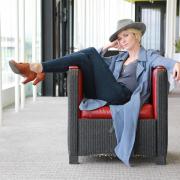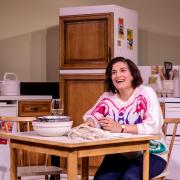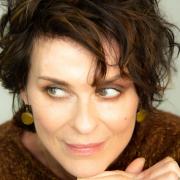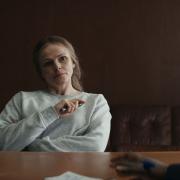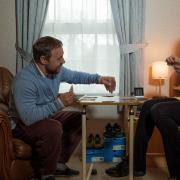Maxine Peake, the star of new film Gwen, has won plaudits for her gritty work on stage and screen but she didn’t set out to work in serious drama.

Maxine Peake is one of our finest actors, renowned for serious roles on stage and screen, but it was never her intention to focus on drama. Growing up, she remembers watching the likes of Victoria Wood and Julie Walters, 'really funny female performers' who had an accent and seemed accessible to a 10-year-old eagerly watching television in Bolton.
'It was always comedy, never really straight acting because I didn't think there were many parts for me,' says the 45-year-old who's received two BAFTA nominations.
'It's only as I delved a bit deeper and got into, I hate the word kitchen-sink dramas, but those kinds of films from the Sixties, and then you start to discover things as you go along. I thought, 'Oh there is a world for me out there'.'
Maxine is chatty and warm, a far cry from the sombre roles she's become associated with. She's also super-busy. She recently completed filming Anne, an ITV series in which she depicts the late Hillsborough justice campaigner Anne Williams; performed the one-woman play Avalanche, an adaptation of Julia Leigh's memoir, at London's Barbican, which will transfer to Sydney soon, and played the title role in The Nico Project, about the Velvet Underground performer, at Manchester International Festival.

'I actually really enjoy playing real-life people.
In some respects, it's easier because the research is there, but it's more challenging because people have a view and they know who that person was. You're always going to have someone say, 'Well, you're nothing like them' but I never try to do an impersonation. The idea is to try and capture the essence of somebody's spirit and personality.'
The Nico Project saw her team-up with her long-time collaborator Sarah Frankcom with whom she's worked on Miss Julie, The Masque of Anarchy and Hamlet to great acclaim.
But even after all these years, she's not immune to stage fright.
'Oh yeah, I get it all the time,' she says. 'I can get very anxious before I go on.'
Maxine was born in Westhoughton and was 13 when she joined Bolton's Octagon Youth Theatre, and shortly after, Manchester's Royal Exchange youth theatre.
After a series of knockbacks, she successfully auditioned for RADA and at the age of 21 moved to London where she stayed for 12 years before returning north. She now lives in Salford.
Her first notable job was in Victoria Wood's comedy Dinnerladies, and then Paul Abbott's seminal series Shameless before she was cast in 2006's See No Evil, a drama about the notorious crimes committed by Ian Brady and Myra Hindley during the Sixties.
'I thought I wouldn't mind doing something serious and when I heard about See No Evil, I thought that would be a challenge, something fascinating to attempt,' says Maxine, but walking in the shoes of someone as monstrous as Hindley haunted her.
'I'd be lying if I said it didn't. I liken it a bit to having a hangover when you finish, or when you go home. It leaves a bit of a residue, it lingers.
'But I'd say with any part, there's always a little element where you get the blues, mainly because you're doing a job and it's intense and you're in there all day, working hard and then it all stops. It takes you a while to adjust, but some parts leave an imprint for a few weeks and others you can wash off the next day.'
See No Evil was a turning point for Maxine, and she subsequently featured in The Devil's Whore, Little Dorrit, Red Riding and Criminal Justice.
'One thing I do as a performer is try to find similarities between myself and the character. You'll always find some character trait. I think there's the side of us we choose to show and a side we don't, so it's a lot about that,' she says.
In 2011, she made her first appearance as the no-nonsense barrister Martha Costello in Silk, but after three series, was keen to tackle new roles. She went on to appear in projects as diverse as the The Village, Three Girls, about the Rochdale sex grooming gangs, and Charlie Brooker's dystopian series Black Mirror. On the big screen, she starred in the comedy Funny Cow and Mike Leigh's Peterloo. But she doesn't name any of these as her proudest work to date.
'We did a remake of Room at the Top (in 2012) for the BBC but there was trouble with the rights, and it didn't get shown when it should've done, and it fell under the radar. I was just really proud of it and I never say I'm proud of anything I've done. There's stuff I've enjoyed and glad I did, and at the time might have been risky choices or whatever, but I'd say that was my favourite piece.'
Her latest film is a gothic thriller called Gwen about the calamities that befall a mother (Maxine) and her two daughters on their secluded farm in 19th century Snowdonia.
'William (McGregor, the director) told me in a letter that although it was based in the folk-horror genre it was really about the evils of capitalism, and the effects the industrial revolution had on the landscape and the environment. Politically, anything like that piques my interest,' says Maxine who's been vocal about her support for Labour over the years.
At a recent BAFTA retrospective held in her honour, host Miranda Sawyer asked if she'd ever be tempted to play someone who went against her political views.
'I would play a raving Tory, I would play a right-wing extremist, if the story is saying something I feel,' she told the audience. 'I don't have to be the good person in the story as long as the story is telling something that I feel is important and I believe in.'
Whether it's tackling controversial roles, walking away from projects that are financially lucrative but lacking creatively, or speaking-up for what she believes in, Maxine is forever fearless.
'I think it's a little about the way I was brought up. I had very political grandparents who were a huge influence on me,' she says.
'But in some respect, it's always a bit of surprise for me that I'm still working in this business. I suppose there are two ways you can look at it. You can start off with nothing and have everything to lose, or you can start off with nothing and you've got nothing to lose because you never had much in the first place. I think I'm a little bit like that. I think, 'Why be scared?''








